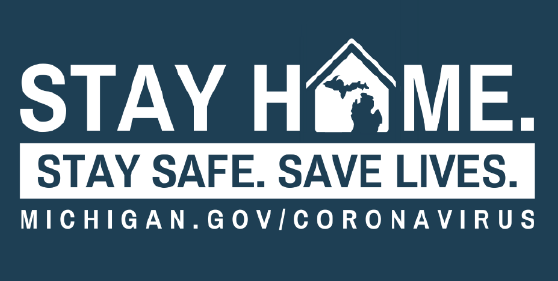
Further details on business operations during ‘Stay Home, Stay Safe’ order
March 23, 2020
Today, Governor Gretchen Whitmer signed the “Stay Home, Stay Safe” Executive Order (EO 2020-21), directing all Michigan businesses and operations to temporarily suspend in-person operations that are not necessary to sustain or protect life. The order also directs Michiganders to stay in their homes unless they’re a part of that critical infrastructure workforce, engaged in an outdoor activity, or performing tasks necessary to the health and safety of themselves or their family, like going to the hospital or grocery store.
- No person or entity shall operate a business or conduct operations that require workers to leave their homes or places of residence except to the extent that those workers are necessary to sustain or protect life or to conduct minimum basic operations.
a. For purposes of this order, workers who are necessary to sustain or protect life are defined as “critical infrastructure workers,” as described in sections 8 and 9.
b. For purposes of this order, workers who are necessary to conduct minimum basic operations are those whose in-person presence is strictly necessary to allow the business or operation to maintain the value of inventory and equipment, care for animals, ensure security, process transactions (including payroll and employee benefits), or facilitate the ability of other workers to work remotely.
Businesses and operations must determine which of their workers are necessary to conduct minimum basic operations and inform such workers of that designation. Businesses and operations must make such designations in writing, whether by electronic message, public website, or other appropriate means. Such designations, however, may be made orally until March 31, 2020 at 11:59 pm.
5. Businesses and operations that employ critical infrastructure workers may continue. Businesses and operations need not designate:
i. Workers in health care and public health.
ii. Workers who perform necessary government activities, as described in section 6
iii. Workers and volunteers described in section 9(d).
a. In-person activities that are not necessary to sustain or protect life must be suspended until normal operations resume.
Businesses and operations maintaining in-person activities must adopt social distancing practices and other mitigation measures to protect workers and patrons. Those practices and measures include, but are not limited to:
i. Restricting the number of workers present on premises to no more than is strictly necessary to perform the business’s or operation’s critical infrastructure functions.
ii. Promoting remote work to the fullest extent possible.
iii. Keeping workers and patrons who are on premises at least six feet from one another to the maximum extent possible, including for customers who are standing in line.
iv. Increasing standards of facility cleaning and disinfection to limit worker and patron exposure to COVID-19, as well as adopting protocols to clean and disinfect in the event of a positive COVID-19 case in the workplace.
v. Adopting policies to prevent workers from entering the premises if they display respiratory symptoms or have had contact with a person who is known or suspected to have COVID-19.
vi. Any other social distancing practices and mitigation measures recommended by the Centers for Disease Control.
c. For purposes of this order, critical infrastructure workers are those workers described by the Director of the U.S. Cybersecurity and Infrastructure Security Agency in his guidance of March 19, 2020 on the COVID-19 response (available here). Such workers include some workers in each of the following sectors:
a. Health care and public health.
b. Law enforcement, public safety, and first responders.
c. Food and agriculture.
d. Energy.
e. Water and wastewater.
f. Transportation and logistics.
g. Public works.
h. Communications and information technology, including news media.
i. Other community-based government operations and essential functions.
j. Critical manufacturing.
k. Hazardous materials.
l. Financial services.
m. Chemical supply chains and safety.
n. Defense industrial base.
o. For purposes of this order, critical infrastructure workers also include:
i. Child care workers
ii. Workers at designated suppliers and distribution centers, as described below.
1. A business or operation that employs critical infrastructure workers may designate suppliers, distribution centers, or service providers whose continued operation is necessary to enable, support, or facilitate the work of its critical infrastructure workers.
2. Such suppliers, distribution centers, or service providers may designate workers as critical infrastructure workers only to the extent those workers are necessary to enable, support, or facilitate the work of the original operation’s or business’s critical infrastructure workers.
3. Designated suppliers, distribution centers, and service providers may in turn designate additional suppliers, distribution centers, and service providers whose continued operation is necessary to enable, support, or facilitate the work of their critical infrastructure workers.
4. Businesses, operations, suppliers, distribution centers, and service providers must make all designations in writing to the entities they are designating, whether by electronic message, public website, or other appropriate means. Such designations may be made orally until March 31, 2020 at 11:59 pm. 5. Businesses, operations, suppliers, distribution centers, and service providers that abuse their designation authority shall be subject to sanctions to the fullest extent of the law.
p. Workers in the insurance industry, but only to the extent that their work cannot be done by telephone or remotely.
q. Workers and volunteers for businesses or operations (including both and religious and secular nonprofit organizations) that provide food, shelter, and other necessities of life for economically disadvantaged or otherwise needy individuals, individuals who need assistance as a result of this emergency, and people with disabilities.
r. Workers who perform critical labor union functions, including those who administer health and welfare funds and those who monitor the well-being and safety of union members who are critical infrastructure workers, provided that any administration or monitoring should be done by telephone or remotely where possible.